Related Research Articles

Sir William Dugdale was an English antiquary and herald. As a scholar he was influential in the development of medieval history as an academic subject.

Alvecote Priory is a ruined Benedictine Priory in Alvecote, Warwickshire, England. The site has been scheduled as an ancient monument. Now very little remains of the priory, most of the walls have been eroded but a fairly high wall remains on one side. The main entrance arch is the most impressive feature, still standing at around 20 feet (6.1 m) high. The attached dovecote also survives, however both the ruined priory and dovecot are on the Heritage at Risk Register due to vandalism and water damage.

Compton Verney is a parish and historic manor in the county of Warwickshire, England. The population taken at the 2011 census was 119. The surviving manor house is the Georgian mansion Compton Verney House.
Blythe End is a hamlet in the North Warwickshire district of Warwickshire, England. Blythe End is halfway between Coleshill and Shustoke on the B4114 road. There are a few houses, an old mill and a water works. The most famous building is Blyth Hall, built by Sir William Dugdale in the 17th century, but with 18th-century additions. It is still the family home. Sir William Dugdale was born at Shustoke. He recorded the nearby Blythe Bridge, which carries the road over the River Blythe, as dating from 1439.
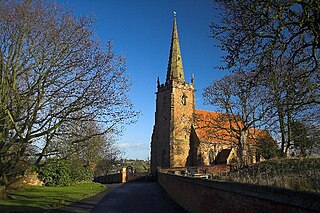
Shustoke is a village in the North Warwickshire district of the county of Warwickshire in England. The population of the civil parish at the 2011 census was 549. It is situated 2.5 miles northeast of Coleshill, 7.5 miles southwest of Atherstone, 9.5 miles west of Nuneaton and 12.5 miles east-northeast of Birmingham. It includes the sub-village of Church End half-a-mile to the east, where the parish church of Saint Cuthbert's is situated.

Offchurch Bury is a manor house one mile north-west of the centre of the village of Offchurch, Warwickshire, England. It is supposed to represent the site of a palace of the Anglo-Saxon King Offa of Mercia (d.796), after which Offchurch is named, "bury" being a corruption of "burh" meaning a fortified place. William Dugdale in his Antiquities of Warwickshire (1656) stated concerning the manor of Offchurch:
There have been two baronetcies created for persons with the surname Dugdale, both in the Baronetage of the United Kingdom.
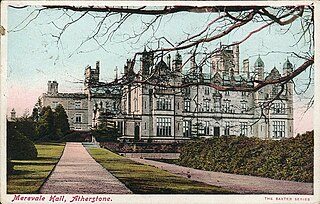
Merevale Hall is a private country house in Merevale, near Atherstone, Warwickshire, England. It is a Grade II* listed building. The estate descends from Merevale Abbey which once stood on the site.
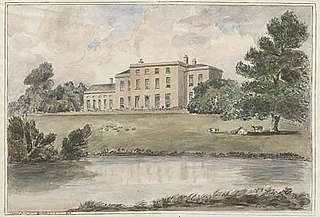
Milford Hall is a privately owned 18th-century English country house at Milford, near Stafford. It is the family seat of the Levett Haszard family and is a Grade II listed building.
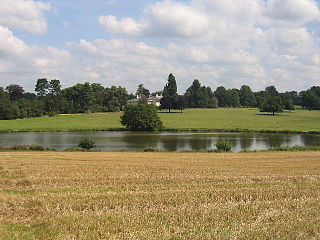
Berkswell Hall is a 19th-century country house at Berkswell, formerly Warwickshire now West Midlands, now converted into residential apartments. It is a Grade II* listed building.

Brownsover Hall is a 19th-century mansion house in the old village of Brownsover, Rugby, Warwickshire which has been converted for use as a hotel. It is a Grade II* listed building.

Clopton House is a 17th-century country mansion near Stratford upon Avon, Warwickshire, now converted into residential apartments. It is a Grade II* listed building.
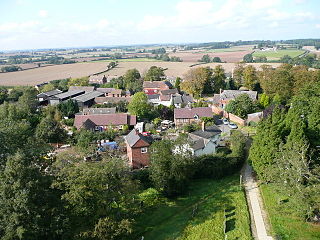
Clifton Campville is a village, former manor and civil parish in Staffordshire, England. It lies on the River Mease, about 10 miles (16 km) east of the City of Lichfield, 6 miles (10 km) west of Measham and 7 miles (11 km) north of Tamworth. The village lies close to Staffordshire's borders with Derbyshire, Leicestershire and Warwickshire. The parish, which includes Haunton village, had a population of 912 at the 2011 census. There is a fine gothic church, dedicated to St Andrew, and listed Grade I. The village pub, The Green Man, is also a historic building.
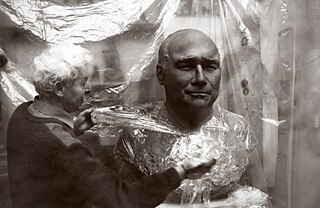
Sir William Stratford Dugdale, 2nd Baronet, was the chairman of Aston Villa from 1975 to 1978. Dugdale arrived at Aston Villa as a director when they were in the third division, having been relegated due to poor performances on and off the pitch. He left the club in 1982, the year they won the European Cup. Following several successful years as a director in the early-1970s, he was elected chairman in 1975, taking over the position from Doug Ellis, the package holiday businessman, before being replaced by Harry Kartz.
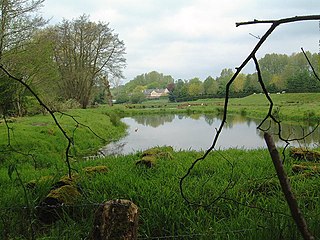
Kerswell Priory was a small Cluniac priory in the parish of Broadhembury in Devon, England.
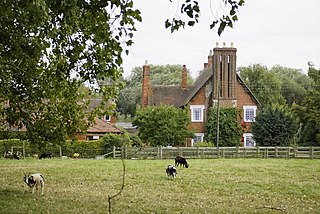
Studley Priory, Warwickshire, was a priory in Studley, Warwickshire, England.

St John's House is an historic house located in Warwick, just east of the town centre, in Warwickshire, England. It is now an Education, Event and Wedding Venue operated by Heritage and Culture Warwickshire, part of Warwickshire County Council. It has a history spanning almost 900 years. To the side of the house is a small garden belonging to St John's and to the rear is the large St. Nicholas' Park. The current grade I listed building dates from around 1666, and is considered one of the most important buildings in Warwick.

The House of Stratford is a British aristocratic family, originating in Stratford-on-Avon between the eleventh and thirteenth centuries. The family has produced multiple titles, including Earl of Aldborough, Viscount Amiens, Baron Baltinglass, Viscount Stratford de Redcliffe and the Dugdale Baronets. The Viscount Powerscourt and Baron Wrottesley both claim descent from this House. Historic seats have included Farmcote Manor and Stratford Park in Gloucester, Merevale Hall in Warwickshire, Baltinglass Castle, Belan and Aldborough House in Ireland, and Stratford House in London, amongst many others. The house was at its most powerful in the fourteenth, sixteenth, and eighteenth centuries.
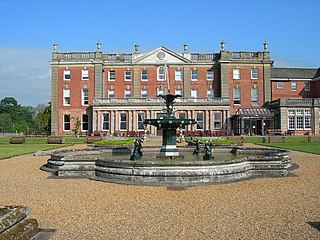
Newbold Revel refers to an existing 18th-century country house and a historic manorial estate in North East Warwickshire. In the fifteenth century, the estate was the home of the medieval author Sir Thomas Malory. The house is today used by HM Prison Service as a training college; it is a Grade II* listed building.
Dugdale Stratford Dugdale (1773–1836) was a Member of Parliament for Warwickshire from 1802 to 1831.
References
- ↑ Dawkins, Andrew; Williams, Richard (7 May 2024). "Family opening 17th Century stately home to public". BBC. Retrieved 7 May 2024.
- Warwickshire Museum Timetrail
- Burkes Genealogical and Heraldic History of the Landed Gentry (Bernard Burke)